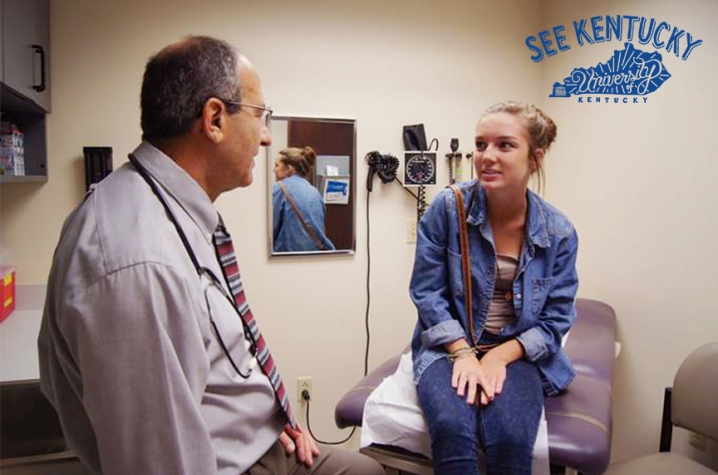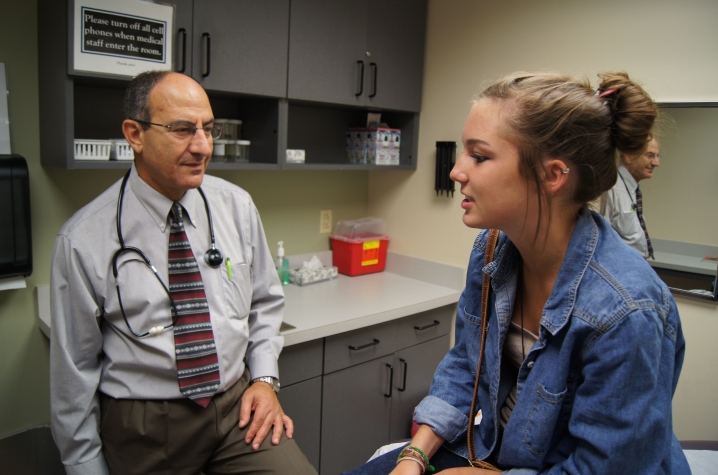UK Adolescent Medicine Reaches Rural Teens through Health Clinics in Schools
LEXINGTON, Ky. (Sept. 26, 2014) — Off the top of her head, Kaylee Brown can think of 10 girls at her high school who are pregnant. One of them is her younger brother's age, and he's only 14.
But when asked about her priorities, 16-year-old Kaylee doesn't mention dating or boys. Wearing a swing purse and a denim shirt during an appointment with Dr. Hatim Omar at the University of Kentucky Adolescent Care Clinic, Brown talks about assuming a leadership role with her Future Farmers of America chapter, playing on her high school volleyball team and making good grades in her advanced-level classes. The farmer's daughter needs good grades to achieve her goals of going to college and becoming a large animal veterinarian.
A student at Lincoln County High School, Brown knows about the health stigmas associated with teens in her hometown and other rural areas of Kentucky. Lincoln County's teen pregnancy rate is high in a state that leads the nation in teen pregnancy. In a 2007 study of county health from the Kentucky Institute of Medicine, Lincoln County was one county that trailed in high school graduation rates, but showed high rates of youth smoking. Brown said many girls at her school also deal with intense social pressures to be "perfect" and other mental health issues.
"Lincoln County was like that high school that nobody thought any good would come out of," Brown said.
Brown believes Omar, chief of Department of Adolescent Medicine at UK, is one doctor who is trying to change that perception of teens in Lincoln County. Through a partnership with school district offices, Omar and his staff provide on-site health clinics at six high schools and middle schools in Lincoln and Boyle counties. A member of the UK Department of Adolescent Medicine visits schools once a week, and Omar visits the schools at least once a month. They provide services that range from physical examinations to mental health consultations to dietary recommendations, and when necessary, more specialized care.
Kaylee Brown and her mom Miranda Brown were so impressed with Omar and his staff that they travel to Lexington for more specialized headache care at the Kentucky Clinic. Omar diagnosed Brown with polycystic ovarian syndrome, which caused unbearable migraines that disrupted her daily life. He prescribed a medication that helps Brown concentrate on the activities she loves. In addition, he helped her cope with depression that was coupled with frequently feeling ill.
Omar has seen many teens in Lincoln County who are in dire need of attention. Most teens aren't dealing with illness, so health care issues in this age group are related to their environment, personal choices and mental wellness. Omar's clinic deals with issues including drug use, pregnancy, sexually transmitted diseases, suicide, eating disorders, anxiety, depression and more. He's seen teens in Lincoln County who are homeless, abandoned by their parents and struggling to survive. He said having one adult who cares and one activity to engage them can direct teens toward a better life.
"Most of the problems are the things that they do because of their environment," Omar said of teens. "The approach has to be, 'I am here for you — how do I help you make the best out of this life?'"
Eva Stone, a nurse practitioner and school health coordinator for Lincoln and Boyle county schools, reached out to Omar seven years ago after a teen attending one of the high schools committed suicide. After discussing the need for more adolescent health resources in rural Kentucky, she contracted Omar and UK Adolescent Medicine to provide regular in-house clinical visits at local schools. Stone said many students have difficulty accessing a health care provider. Stone doesn't believe adolescent health issues are unique to Lincoln County, but these health disparities are linked to environmental factors, such as poverty and high instances of drug use, which are found throughout rural Kentucky.
"Being a rural community, there are stresses that go along with poverty," Stone said. "We have kids with unstable home situations, we have kids that are homeless, we have kids who don't have food on the weekend — and being in the middle of that, they are trying to be a teenager."
Since coming to Lincoln County, Omar has assisted with the development of student health protocol in the school system and hosted community outreach events, including a youth suicide awareness day. He also helped introduce a 20-question health screening, which is reviewed with middle school students at the beginning of every school year. Health officials then use the screening as a tool to measure preventable health risks in the student population.
Stone admires Omar's ability to relate to teens. She said he doesn't treat them like a "15-minute office appointment." For this reason, Omar has few no-shows for appointments at the Kentucky Clinic.
"He has a heart for kids that I've never experienced before," Stone said.
Omar is now working with community activists in Lincoln County to establish an adolescent health clinic in the developing King's Mountain Community Center. He views Lincoln and Boyle County schools a platform for spreading awareness of the importance of adolescent health across the state.
"Teens in all of rural Kentucky need help and attention," Omar said. "Lincoln County was one of the worst counties in teen outcomes statewide, and the school officials were happy to collaborate with us to improve these outcomes. Lincoln County is one of the examples of how doing the right thing can help."
Kentucky Education Television (KET) will air a program in the spring highlighting Omar and his work with teens in Kentucky.
MEDIA CONTACT: Elizabeth Adams, elizabethadams@uky.edu






